There is a not-so-secret movement growing around the country, and it has found fertile ground in Port Townsend and Jefferson County. You can sometimes see the evidence tucked away in backyards and …
This item is available in full to subscribers.
We have recently launched a new and improved website. To continue reading, you will need to either log into your subscriber account, or purchase a new subscription.
If you had an active account on our previous website, then you have an account here. Simply reset your password to regain access to your account.
If you did not have an account on our previous website, but are a current print subscriber, click here to set up your website account.
Otherwise, click here to view your options for subscribing.
* Having trouble? Call our circulation department at 360-385-2900, or email our support.
Please log in to continue |
|
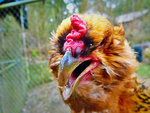
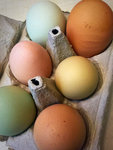
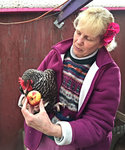
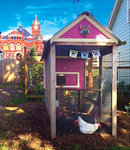
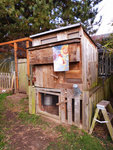
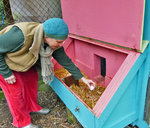
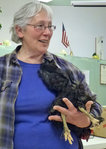
There is a not-so-secret movement growing around the country, and it has found fertile ground in Port Townsend and Jefferson County. You can sometimes see the evidence tucked away in backyards and lush green gardens. And if you listen closely, you might hear the soft chuckles and clucks of a growing population of backyard, or urban, chickens.
Jefferson County is a mecca for sustainable living, and some residents are taking sustainability to the next step, adding chickens into the mix (but not always into the pot).
At a recent seminar organized by Jefferson County Master Gardeners, Judy Stewart, considered the local chicken guru, talked about the joys, the trials and the tribulations of raising chickens. She brought “props” with her, which included a rooster, a hen with three pullets and an older hen who was being nursed back to health. Stewart lives out in the county on 10 acres and has, she guessed, more than 100 birds under her care.
Raising chickens for eggs started as a hobby for her in 1996, and quickly became a passion. Stewart talked about her methods and how she operates a continuous cycle that includes using the chicken manure in compost, which, in turn, is used for the worms she raises to produce vermicompost to germinate the seeds that add to the chicken feed.
“We are what we eat, and so are the chickens,” Stewart affirmed, adding that she avoids all pesticides and additives, keeping her birds as healthy and organic as possible.
“Learn how to take care of problems with your flock,” she advised, saying that she finds most of the answers she needs on YouTube. She has learned to take care of many of the health problems that have arisen, saying it isn’t worth it to spend vast amounts on veterinary bills when you can handle things yourself. She went on to describe some of the problems chickens sometimes have, including bumblefoot (infection of the foot) and eggs stuck in the tract. The answer to that second issue was Vaseline.
Predators are a problem in this area, and they include coyotes, raccoons, eagles and owls. Even a crow or raven will come swooping in, spear an egg with its beak and fly off. According to Stewart, you must be prepared for nature.
“You can tell what has harmed your birds by what’s left.” For instance, raccoons can devastate a flock if they manage to get into a coop. They will kill whatever they can, eat parts of the birds and leave the rest. The key is to build your coop like a fortress to protect the flock.
URBAN CHICKENS
The same precautions apply to urban chicken keepers. Manresa Mama, aka Lyn Hersey, the oldest Kinetic Festival Rose Hips Queen still living in Port Townsend, has fortified the coop that houses her girls, who are named Lady Antebellum, Blondie and two Helens (“They look so alike, I call them Helen 1 and Helen 2”). The “Chicks Rule” coop, which Hersey built herself and considers “mediocre” to comply with Kinetic Skulpture standards, is constructed from recycled and found supplies. She has made it super secure with a double layer of wire. Maybe predators have higher-than-mediocre standards because she has had no predator issues.
As a farm girl who grew up in the city, Hersey was happy to be able to have chickens at her home in Port Townsend. After extensive research on YouTube and drawing from knowledge she had gained from her father, who raised pigeons, she raised her chicks in the bathtub until they were 2 months old, when they were transferred to the coop.
“That was a smelly time,” Hersey said, and she was glad to have them out of the house. Now they are part-time free-range birds, keeping the garden free of slugs, snails and other insects, then being closed up tight at night.
‘PETS WITH BENEFITS’
For Pat and Steve Herkal, who live in the Uptown district near the Jefferson County Courthouse, raising their small flock is an extension of their former lifestyle in Wyoming, where, besides a sizable chicken flock, they also raised peacocks and pheasants. Their four hens – Daisy, Poppy, Violet and Freckles – live part of the day in a coop custom-built from a plan. With its corrugated roof, magenta paint job, prayer flags and evil-eye defender charm over the door, these girls are well protected.
As most small-scale hobby chicken farmers discover, raising chickens for eggs doesn’t save you any money. Hersey figures a dozen eggs costs about $10.
“You definitely don’t save any money,” Steve Herkal agreed. But the payoff comes not just from eating eggs that may turn you off supermarket eggs forever, but from the services the birds provide.
Herkal lines the coop and nesting boxes with pine shavings which are removed periodically and added to the compost. The benefits of the nitrogen-rich product that emerges is evident in their garden. And during vegetable garden season, the plants are kept free of slugs and snails by the foraging girls.
“These are pets with benefits,” Pat Herkal said, laughing. They are also pets that get excited when the Herkal front door opens, because they know they are being let out to range around the garden. “We let them out two or three times a day,” Steve said. As soon as the coop door is unlatched, the girls rush out, chirping and clucking with joy, as they scratch around the plants, doing their chores of cleaning out the bugs and cultivating the surrounding soil.
David Goldsmith, former county administrator, has joined the backyard chicken group with his girls on Morgan Hill. The latest flock came from his brother on Whidbey Island, who had a few extra. Like most of the other hobby farmers, the Goldsmiths raise the chickens primarily for their eggs. However, David is not squeamish about slaughtering if the need arises and uses a game hunter’s technique to skin the bird, rather than pluck it. “Teresa [his wife] discovered that all the bad stuff in a bird is in the skin, so this way, we get rid of it.”
But he watched fondly as the girls scratched their way around the yard, and said that when these hens get too old to lay, he would probably take them to a chicken “hospice” out in the country.
Out in Chimacum, Deanna and Richard Pindell raise a larger flock that includes a cocky rooster, several multihued hens and a pair of ducks. Because the Pindells live in a more rural area, there are no concerns about the rooster crowing, which he does frequently as he lords over his harem. The flock has a large space to roam, but they are conditioned to move back into the eclectic coop as dusk falls. Deanna’s coop, which is constructed of recycled and found materials, is built like a fortress, and the birds know they are safe when they retreat at night.
An often overlooked benefit of having chickens is the joy they bring their owners. The activity and the soft clucking noises they make as they scurry around is entertaining and calming. As Judy Stewart put it, “It’s the Zen of it.”